八年级上册英语苏教版八年级au知识点
初二英语上册知识点苏教版

初二英语上册知识点苏教版(经典版)编制人:__________________审核人:__________________审批人:__________________编制单位:__________________编制时间:____年____月____日序言下载提示:该文档是本店铺精心编制而成的,希望大家下载后,能够帮助大家解决实际问题。
文档下载后可定制修改,请根据实际需要进行调整和使用,谢谢!并且,本店铺为大家提供各种类型的经典范文,如演讲稿、总结报告、合同协议、方案大全、工作计划、学习计划、条据书信、致辞讲话、教学资料、作文大全、其他范文等等,想了解不同范文格式和写法,敬请关注!Download tips: This document is carefully compiled by this editor. I hope that after you download it, it can help you solve practical problems. The document can be customized and modified after downloading, please adjust and use it according to actual needs, thank you!In addition, this shop provides you with various types of classic sample essays, such as speech drafts, summary reports, contract agreements, project plans, work plans, study plans, letter letters, speeches, teaching materials, essays, other sample essays, etc. Want to know the format and writing of different sample essays, so stay tuned!初二英语上册知识点苏教版初中的英语学习首先是一个记忆过程,尤其是升到八年级后,我们接触的内容增加了很多,需要记忆的词汇、句型和语法知识也随之增加了。
苏教版八年级上册英语知识点汇总

苏教版八年级上册英语知识点汇总一、词汇与短语1.高级词汇扩展:在七年级基础上,进一步学习并掌握更多高级词汇,涵盖更广泛的主题,如自然环境、科技、文学、历史、社会现象等。
2.短语与固定搭配:积累并熟练运用常用的短语、固定搭配和习惯用语,以增强语言表达的准确性和地道性。
二、语法知识1.时态深化:o一般过去时与现在完成时的对比:深入理解两种时态的区别,学会在适当语境中使用。
o过去进行时:学习并掌握过去进行时的用法,描述过去某个时间点正在进行的动作。
o将来时态:复习一般将来时,并引入新的将来时态表达法,如be going to, will等。
2.被动语态:学习并掌握一般现在时、一般过去时、一般将来时的被动语态,理解其用法和构成。
3.条件句:引入条件句的概念,学习零条件句(if...will...)、第一条件句(if...do...will...do...)的基本用法。
4.从句:初步接触并学习宾语从句、状语从句(如时间状语从句、原因状语从句)的用法和构成。
5.非谓语动词:了解动名词、不定式和分词(现在分词、过去分词)的基本概念和用法。
三、听力与口语1.听力技能提升:通过多样化的听力材料(如对话、短文、新闻、讲座等),提高学生的听力理解能力,包括捕捉关键信息、理解隐含意义等。
2.口语表达:加强口语训练,通过角色扮演、小组讨论、辩论等形式,提高学生的口语表达能力和交际技巧。
3.发音与语调:继续注重发音的准确性和语调的自然性,通过模仿、跟读等方式,提高学生的语音语调水平。
四、阅读与写作1.阅读技巧:培养学生快速阅读、仔细阅读、批判性阅读等多种阅读技能,通过阅读不同体裁的文章(如记叙文、说明文、议论文等),提高阅读理解能力。
2.阅读策略:引导学生学会预测、概括、推断等阅读策略,提高阅读效率和深度。
3.写作技巧:学习并掌握不同文体的写作技巧(如书信、日记、议论文等),通过写作练习,提高学生的写作能力。
4.写作过程:引导学生经历构思、起草、修改、校对等写作过程,培养良好的写作习惯。
初二英语上册知识点苏教版
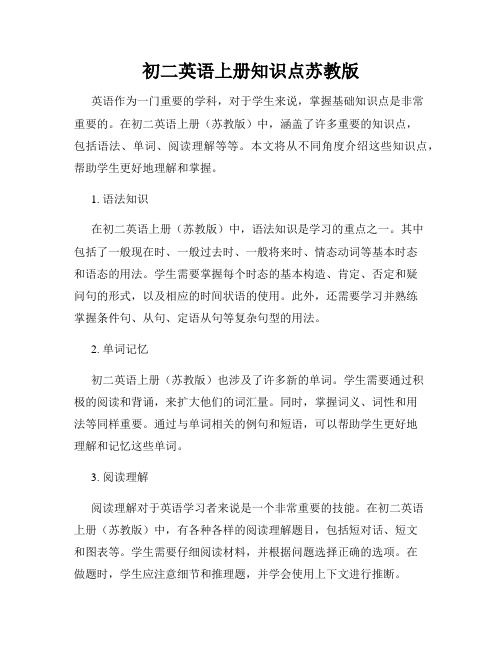
初二英语上册知识点苏教版英语作为一门重要的学科,对于学生来说,掌握基础知识点是非常重要的。
在初二英语上册(苏教版)中,涵盖了许多重要的知识点,包括语法、单词、阅读理解等等。
本文将从不同角度介绍这些知识点,帮助学生更好地理解和掌握。
1. 语法知识在初二英语上册(苏教版)中,语法知识是学习的重点之一。
其中包括了一般现在时、一般过去时、一般将来时、情态动词等基本时态和语态的用法。
学生需要掌握每个时态的基本构造、肯定、否定和疑问句的形式,以及相应的时间状语的使用。
此外,还需要学习并熟练掌握条件句、从句、定语从句等复杂句型的用法。
2. 单词记忆初二英语上册(苏教版)也涉及了许多新的单词。
学生需要通过积极的阅读和背诵,来扩大他们的词汇量。
同时,掌握词义、词性和用法等同样重要。
通过与单词相关的例句和短语,可以帮助学生更好地理解和记忆这些单词。
3. 阅读理解阅读理解对于英语学习者来说是一个非常重要的技能。
在初二英语上册(苏教版)中,有各种各样的阅读理解题目,包括短对话、短文和图表等。
学生需要仔细阅读材料,并根据问题选择正确的选项。
在做题时,学生应注意细节和推理题,并学会使用上下文进行推断。
4. 写作技巧写作是英语学习的一项基础技能。
初二英语上册(苏教版)中,学生需要学习如何写作不同类型的文章,比如作文、书信等。
在写作方面,学生应注意语法和拼写的正确性,同时也要注重段落结构和连贯性。
另外,一些常用的表达和过渡词语也需要掌握,以提高写作的流畅程度。
总结起来,初二英语上册(苏教版)中的知识点涉及到语法、单词、阅读理解和写作技巧等。
学生需要通过不断学习和实践,掌握这些知识点,并在实际应用中提高自己的英语水平。
通过积极的阅读和写作训练,学生可以提高自己的英语能力,更好地应对学习和生活中的各种挑战。
让我们一起努力,打好英语基础,取得优异的成绩!。
苏教版八年级英语上册知识点
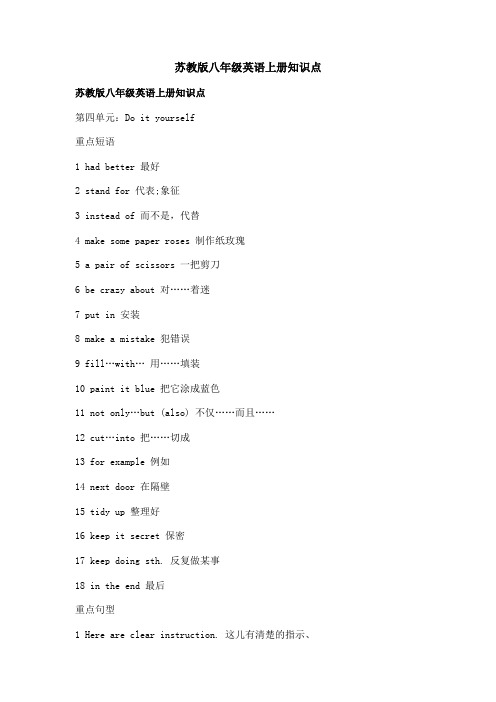
苏教版八年级英语上册知识点苏教版八年级英语上册知识点第四单元:Do it yourself重点短语1 had better 最好2 stand for 代表;象征3 instead of 而不是,代替4 make some paper roses 制作纸玫瑰5 a pair of scissors 一把剪刀6 be crazy about 对……着迷7 put in 安装8 make a mistake 犯错误9 fill…with… 用……填装10 paint it blue 把它涂成蓝色11 not only…but (also) 不仅……而且……12 cut…into 把……切成13 for example 例如14 next door 在隔壁15 tidy up 整理好16 keep it secret 保密17 keep doing sth. 反复做某事18 in the end 最后重点句型1 Here are clear instruction. 这儿有清楚的指示、2 You’d better get some tools. 你最好拿一些工具3 When you do DIY, you make, repair of decorate things yourself instead of paying someone to do it. 当你‘自己动手做’的时候,你自己做,修理或装饰东西,而不是付钱给别人做。
4 Now the living room has not only blue walls but also a blue ceiling and floor. 现在起居室不仅是蓝色,连天花板和地板也是蓝色。
5 They couldn’t stay there because one end of the shelf was much higher than the other! 它们不能呆在那儿,因为架子的一端比另一端高!6 Don’t paint the cat. 不要给猫涂色7 Cut some of the larger fruit into small pieces. 把一些较大的水果切成小块状。
江苏英语八年级上8AU5第五单元单词知识点
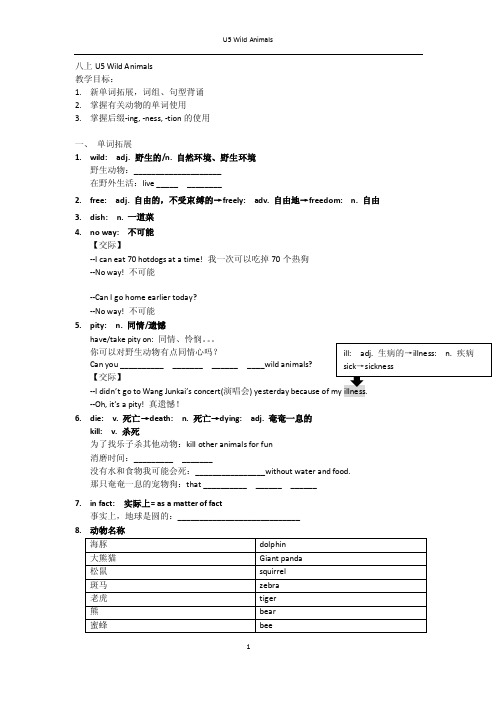
八上U5 Wild Animals教学目标:1. 新单词拓展,词组、句型背诵2. 掌握有关动物的单词使用3. 掌握后缀-ing, -ness, -tion 的使用一、 单词拓展1. wild: adj. 野生的/n. 自然环境、野生环境野生动物:____________________在野外生活:live _____ ________2. free: adj. 自由的,不受束缚的→freely: adv. 自由地→freedom: n. 自由3. dish: n. 一道菜4. no way: 不可能【交际】--I can eat 70 hotdogs at a time! 我一次可以吃掉70个热狗 --No way! 不可能--Can I go home earlier today? --No way! 不可能 5. pity: n. 同情/遗憾have/take pity on: 同情、怜悯。
你可以对野生动物有点同情心吗?Can you __________ _______ ______ ____wild animals? 【交际】--I didn ’t go to Wang Junkai ’s concert(演唱会--Oh, it ’s a pity! 真遗憾!6. die: v. 死亡→death: n. 死亡→dying: adj. 奄奄一息的kill: v. 杀死为了找乐子杀其他动物:kill other animals for fun消磨时间:_________ _______没有水和食物我可能会死:________________without water and food. 那只奄奄一息的宠物狗:that __________ ______ ______ 7. in fact: 实际上= as a matter of fact事实上,地球是圆的:____________________________ 8. 动物名称9.Xi Wang means “hope ” in Chinese. 10. be born: 出生我出生在七月二十三号:I ______ _______ on July 23rd . 11. beginning: n. 开始一开始,起初在某事的一开始 结束在某事结束的时候12. face: v. 面对/n. 脸独自面对困难:_______ ___________ ____ ___________ 面对问题:face problems 13. serious: adj. 严重的严重的问题:___________________严重的情况:serious situation14. live on: 以。
八年级上册英语(苏教版八年级)8AU6Grammar语言点(2021年整理)

(完整)八年级上册英语(苏教版八年级)8AU6Grammar语言点(word版可编辑修改)编辑整理:尊敬的读者朋友们:这里是精品文档编辑中心,本文档内容是由我和我的同事精心编辑整理后发布的,发布之前我们对文中内容进行仔细校对,但是难免会有疏漏的地方,但是任然希望((完整)八年级上册英语(苏教版八年级)8AU6Grammar语言点(word版可编辑修改))的内容能够给您的工作和学习带来便利。
同时也真诚的希望收到您的建议和反馈,这将是我们进步的源泉,前进的动力。
本文可编辑可修改,如果觉得对您有帮助请收藏以便随时查阅,最后祝您生活愉快业绩进步,以下为(完整)八年级上册英语(苏教版八年级)8AU6Grammar语言点(word版可编辑修改)的全部内容。
8AU6 Grammar 语言点1。
他来上海拜访他的朋友。
He came to Shanghai to visit his friends2. 政府应该立法来保护野生生物。
The government should make laws to protect wildlife。
3.为了赢得下个月的比赛, 他们每天刻苦训练。
They practice hard every day in order to win the match next month。
4。
我呆在那儿看会发生什么. I stayed there to /in order to see what would happen。
5。
为了不忘记,他记下了我的电话号码。
He wrote down my telephone number in order not to forget it。
6.为了赶上早班车, 今天早上我很早就起床了。
In order to catch the early bus, I got up early this morning.7. 我父亲经常鼓励我努力学习。
My father often encourages me to study hard.8。
八年级上册英语(苏教版八年级)8AU7 Reading语言点

8AU7Reading语言点1.Winter days are full of snow, …(1)winter days= the days of winter 冬天的日子 e.g. The days of spring are windy and bright.(2)be full of =be filled with 充满那个箱子里装满了苹果。
The box is full of apples.他检查工作时必须要再仔细一些——到处是错。
He must check his work more carefully —it’s full of mistakes. 花园里万紫千红。
The garden is full of colourful flowers.图书馆里学生满满的。
The library are full of students. = The library are filled with students.2.When trees and flowers forget to grow, …forget to do 忘记要去做某事。
(未做); forget doing 忘记做过某事。
(已做)办公室的灯还亮着,他忘记关了。
The light in the office is still on. He forgot to turn it off.他忘记他已经关了灯了。
He forgot turning the light off.别忘了关灯。
Don’t forget to turn off the light.我忘记了以前读过这本书。
I forgot reading the book.3.fly far away (from sp to another place) 飞往远处(1) My home is far from school. My home is 30 kilos from school.(2) grow---grew---growngrow up; grow into; grow flowers / grow plants4.What a perfect time (it is) to fly a kite! It is a perfect time to fly a kite.5. among flowers在花丛中6.hide from the April showers 躲避四月的阵雨(阵雨、阵雪、淋浴)(1)这个小偷到处躲避警察。
八年级上册英语苏教版八年级AUReading语言点

八年级上册英语苏教版八年级A U R e a d i n g语言点The document was prepared on January 2, 20218AU3 Reading语言点1. 遍及全世界 around the world= across the world = all over the world2.在一天之内 in a day=during a/ one day3. 8年级1班的学生 the Class1, Grade 8 students =the students in Class1, Grade 84.给某人发电子邮件 email to sb = send an email to sb =write an email to sb5.do fine (do well) 指生活方面的“好” 进展顺利; 过得称心如意(或心满意足)我听说这学期你们大家都很好。
I hear that all of you are doing fine at school this term.我兄弟是个好学生,功课很好。
My brother is a good student and does fine in his lessons.6. Yesterday Kitty’s teacher Mr. Wu invited me to join their school trip to the World Park.邀请某人做某事 invite sb. to do sth. 邀请某人去某地invite sb. to a place你邀请你的朋友来喝茶了吗Did you invite your friends to drink tea?你邀请米莉来你的聚会了吗Did you invite Millie to your party7. join 参加,加入,指加入某一种组织,党派,团体,人群等,成为其中一员,后接名词或代词,(become a member of). 而 join in参加谈话、比赛、娱乐项目等,且加入的活动规模较小take part in, 参加会议或群众性活动,着重说明参加者参加活动并在活动中发挥了作用。
苏教版八上英语知识点
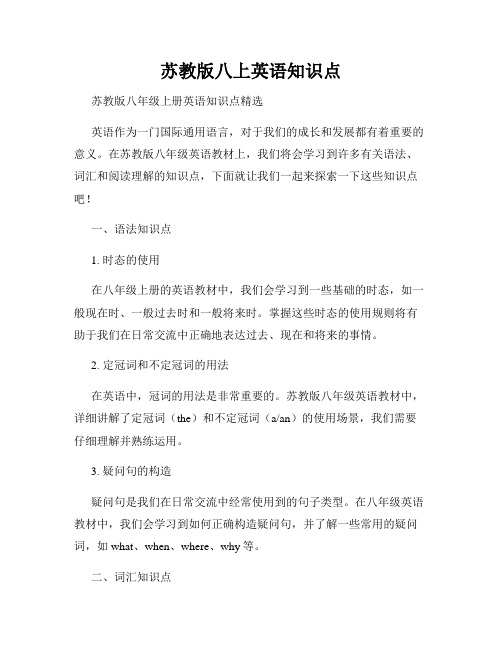
苏教版八上英语知识点苏教版八年级上册英语知识点精选英语作为一门国际通用语言,对于我们的成长和发展都有着重要的意义。
在苏教版八年级英语教材上,我们将会学习到许多有关语法、词汇和阅读理解的知识点,下面就让我们一起来探索一下这些知识点吧!一、语法知识点1. 时态的使用在八年级上册的英语教材中,我们会学习到一些基础的时态,如一般现在时、一般过去时和一般将来时。
掌握这些时态的使用规则将有助于我们在日常交流中正确地表达过去、现在和将来的事情。
2. 定冠词和不定冠词的用法在英语中,冠词的用法是非常重要的。
苏教版八年级英语教材中,详细讲解了定冠词(the)和不定冠词(a/an)的使用场景,我们需要仔细理解并熟练运用。
3. 疑问句的构造疑问句是我们在日常交流中经常使用到的句子类型。
在八年级英语教材中,我们会学习到如何正确构造疑问句,并了解一些常用的疑问词,如what、when、where、why等。
二、词汇知识点1. 动词短语在苏教版八年级英语教材中,我们会学习到一些常用的动词短语,如look after、take care of、get on with等。
通过学习这些动词短语,我们可以丰富自己的词汇量,进一步提高口语表达的能力。
2. 名词的复数形式在英语中,名词的复数形式有着一定的规律。
通过学习八年级上册英语教材,我们可以了解名词复数形式的变化规则,并掌握一些不规则变化的名词复数形式。
3. 形容词和副词的比较级和最高级形容词和副词的比较级和最高级是我们在进行比较时常用到的词汇。
在八年级上册的英语教材中,我们会学习如何正确构造形容词和副词的比较级和最高级,丰富自己的词汇表达能力。
三、阅读理解知识点1. 阅读技巧在苏教版八年级英语教材中,我们将会接触到一些不同类型的阅读材料,如广告、介绍等。
学习阅读材料时,我们需要掌握一些阅读技巧,如捕捉关键词、理解上下文等,以便更好地理解和理解所读材料。
2. 阅读题型在阅读理解中,我们将会遇到一些常见的题型,如选择题、判断题、填空题等。
苏教版初二英语上册知识点

苏教版初二英语上册知识点一.重点词组growup成长;长大everyday每天besureabout对??有把握makesure确信;务必send?to?把??送到??beableto能themeaningof??的意思differentkindsof不同种类的writedown写下;记下havetodowith关于;与??相关系takeup 开始做;学着做hardlyever几乎不;很少too?to?太??而不能??/太??以至于不能二.固定词组搭配begoingto+动词原形打算做某事practicedoing练习做某事keepondoingsth.持续地做某事learntodosth.学会做某事finishdoingsth.做完某事promisetodosth.许诺去做某事helpsb.todosth.协助某人做某事remembertodo/doingsth.记住做某事agreetodosth.同意做某事lovetodo/doingsth.喜爱做某事wanttodosth.想要做某事三.核心知识点1.practicev.练习.实习。
后面多跟名词(词组)或v-ing形式作宾语。
如:IwanttopracticemyspokenEnglishintheEnglishCornerthisweekend.这个周末我想去英语角练习口语。
Listen!Someoneispracticingplayingthepiano.听!有人在练习弹钢琴。
practicen.实践;练习;经验。
多为不可数名词。
如:Practicemakesperfect.[谚]熟能生巧。
Haveyouhadanypracticeinnursingthesick?你有护理病人的经验吗?2.promise许诺.1.承诺,诺言[C][(+of)][+(that)][+to-v]Givemeyourpromisethatyou'llneverbelateagain.答应我你绝不再迟到了。
八年级上册英语苏教版八年级AUReing语言点

八年级上册英语苏教版八年级A U R e i n g语言点集团档案编码:[YTTR-YTPT28-YTNTL98-UYTYNN08]8A U1R e a d i n g语言点1.one of my best friends 我最好的朋友之一one of … ……之一上海是世界上最大的城市之一。
Shanghai is one of the biggest cities inthe world.One of my friends ( come ) from America.Max 是他班上最高的学生之一。
Max is one of the tallest students in his class.这是最重要的会议之一。
It’s one of the most important meetings.2. She is willing to share things with her friends. 她愿意和她的朋友们分享她的东西。
be willing to do sth. 乐意/愿意去做某事 = be ready / glad / happy todo sth.我很愿意你成为你的好朋友。
I’m willing to be your good friend.= I’mready to be your good friend.你愿意为我保守秘密吗? Are you willing to keep a secret for me?share sth. with sb. 和某人分享…我的女儿很乐意和她的朋友分享她的玩具。
My daughter is willing to shareher toys with her friends.3. any time = anytime 任何时候明天任何时候你可以打电话给我。
You can call me any time tomorrow.4. someone in need 有需要的人为什么不尽你所能去帮助有需要的人。
(完整)八年级上册英语(苏教版八年级)8AU4Reading语言点
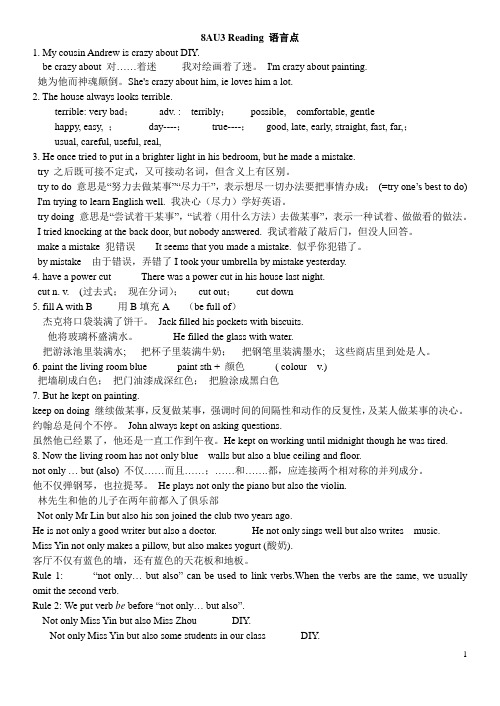
8AU3 Reading 语言点1. My cousin Andrew is crazy about DIY.be crazy about 对……着迷我对绘画着了迷。
I'm crazy about painting.她为他而神魂颠倒。
She's crazy about him, ie loves him a lot.2. The house always looks terrible.terrible: very bad;adv. : terribly;possible, comfortable, gentlehappy, easy, ;day----;true----;good, late, early, straight, fast, far,;usual, careful, useful, real,3. He once tried to put in a brighter light in his bedroom, but he made a mistake.try 之后既可接不定式,又可接动名词,但含义上有区别。
try to do 意思是“努力去做某事”“尽力干”,表示想尽一切办法要把事情办成;(=try one’s best to do) I'm trying to learn English well. 我决心(尽力)学好英语。
try doing 意思是“尝试着干某事”,“试着(用什么方法)去做某事”,表示一种试着、做做看的做法。
I tried knocking at the back door, but nobody answered. 我试着敲了敲后门,但没人回答。
make a mistake 犯错误It seems that you made a mistake. 似乎你犯错了。
by mistake 由于错误,弄错了I took your umbrella by mistake yesterday.4. have a power cut There was a power cut in his house last night.cut n. v. (过去式;现在分词);cut out;cut down5. fill A with B 用B填充A (be full of)杰克将口袋装满了饼干。
八年级上册英语(苏教版八年级)8AU5 Integrated 语言点

8AU5 Integrated 语言点一、词组1. like to live alone 喜欢独居2. dark stripes 深色的条纹3. for a short while 一会儿4. thick fur 厚厚的皮毛5. smell things far away 闻到远处的东西6. lose one’s lives失去生命7. run for hours without stopping 跑好几个小时而不停止8.work as a team 作为一个团队一起工作9. kill for fun 为乐趣而杀生10. some wild animals in danger 一些处于危险中的野生动物11. have fewer and fewer living areas 生存区域越来越小12. It’s a great pity. 非常可惜13. what a shame真可惜14. fur coats 皮草衣服15. not…any more 不再16. protect wild animals 保护野生动物二、语言点1. while1) n. “一会儿,一段时间” 通常用单数,for a (short) while 一(小)会儿in a little/ short while “一会儿后“他们聊了一会儿。
They chatted for a while.他一会儿就回来。
He will be back in a little/ short while.2) 连词: 当…时候While doing sth; while+ 句子He listened to music while doing his homework. =He listened to music while he was doing his homework.2. catch (caught, caught)捉住,捕获catch fish;catch the thief;catch the first/ last bu;s be caught in the rain/ snow/ storm3. thick adj. 厚的,密的,浓的(反义词:thin)wear thick glasses; live in the thick forest;thick smoke; thick fog; thick fur; thick snow; thick eyebrows/ beards4. kill 杀死(区别于die)Cancer kills thousands of people every year.他两年前死了。
苏教版八年级上册英语知识点归纳及总结
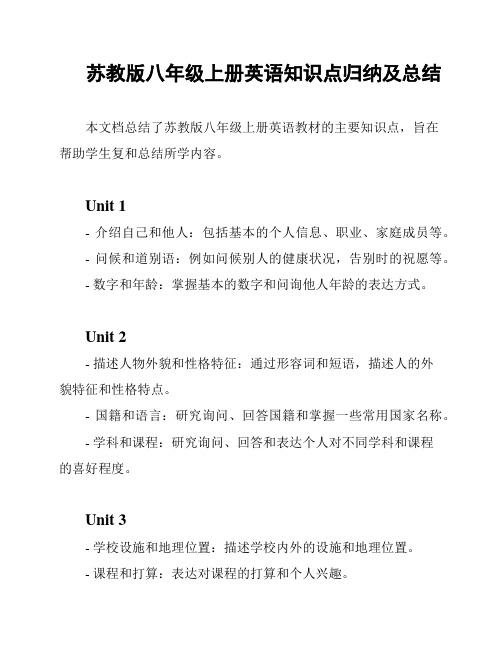
苏教版八年级上册英语知识点归纳及总结本文档总结了苏教版八年级上册英语教材的主要知识点,旨在帮助学生复和总结所学内容。
Unit 1- 介绍自己和他人:包括基本的个人信息、职业、家庭成员等。
- 问候和道别语:例如问候别人的健康状况,告别时的祝愿等。
- 数字和年龄:掌握基本的数字和问询他人年龄的表达方式。
Unit 2- 描述人物外貌和性格特征:通过形容词和短语,描述人的外貌特征和性格特点。
- 国籍和语言:研究询问、回答国籍和掌握一些常用国家名称。
- 学科和课程:研究询问、回答和表达个人对不同学科和课程的喜好程度。
Unit 3- 学校设施和地理位置:描述学校内外的设施和地理位置。
- 课程和打算:表达对课程的打算和个人兴趣。
- 学校生活:描述学生在学校的日常生活,如课间活动、午餐等。
Unit 4- 身体部位和健康问题:掌握人体部位的名称,并能描述一些常见的健康问题。
- 看病和医生建议:研究在医生面前描述自己的症状,并理解医生的建议和指示。
Unit 5- 家庭成员和关系:描述自己和他人的家庭成员以及人际关系。
- 家庭活动和日常生活:描述家庭活动和日常生活的一些常用表达。
Unit 6- 过去发生的事情与经历:通过一般过去时,描述和谈论过去发生的事情和个人经历。
- 过去常常和过去总是:描述过去经常发生或总是发生的动作。
Unit 7- 购物和物品描述:研究购物的场景和一些常用的物品描述词汇。
- 职业和工作:了解和描述一些常见的职业和相关的工作内容。
Unit 8- 宠物和动物保护:描述个人对宠物和动物保护的看法。
- 表示喜欢和讨厌:研究表达自己对事物、人和活动的喜好和厌恶。
以上是苏教版八年级上册英语教材的主要知识点的简要归纳和总结。
希望本文档对学生们的复习和回顾有所帮助。
(完整)八年级上册英语(苏教版八年级)8AU5Reading语言点

8AU5 Reading 语言点1. I first saw the baby panda when she was only ten days old. = I saw the baby panda for the first time when…(1) first= for the first time上周我第一次在南通市中心看到他。
(两种)She borrowed some books from the school library for the first time. (2 )the baby panda 熊猫宝宝大熊猫宝宝;熊猫妈妈; 看海豚表演(3)ten days old 十天大2. We called her Xi Wang. call sb…叫某人.. ;称呼某人…他们都叫那个壮实的男孩老虎。
They all called that strong boy Tiger.你用英语怎么称呼他们?What do you call them in English?他住在一个叫桂林的地方。
那个叫露西的女孩是从美国来的。
我们总是叫他小明。
3. mean V. (1)表示…的意思(2)意味着,(3)打算,意欲红灯表示“停” The red light means “stop”.这什么意思?What does it mean?/ 你什么意思?What do you mean?你知道我不是这个意思。
Yon know I don’t mean this.努力工作意味着挣更多的钱。
Working hard means making more money.我不是故意要伤害你。
I didn’t mean to hurt you. 我不是要让你难过。
I didn’t mean to make you sad. meant; meaning; meaningful; meaningless4. When Xi Wang was born, she weighed just 100 grams and looked like a white mouse.(1)be born:出生(=at birth)(2) weigh V. weight n.1) Eddie _______ 500 grams when he was born. What a heavy baby dog!2) The _______ of Eddie is 40 kilograms now. How heavy he is!The baby panda weighs 100 grams. = The weight of the baby panda is 100 grams.这熊猫宝宝多重?Ho w much does the baby panda weigh? =What’s the weight of the baby panda? = How heavy is the baby panda? =How many grams does the baby panda weigh? =How many grams is the baby panda?你多重?What’s your weight?=How much do you weigh?词组:lose weight/ put on weight=become fat weigh as much as two kilos 重达2公斤5. She looked like a white mouse. (提问) What does she look like? mouse---pl. mice6. At four months old, she started to go outside …(1) at four months old= when she was four months old, 表示某人多大时(4种)at one year old; 在16岁时,他去了北京并找了份工作。
苏教版初二英语上册知识点

苏教版初二英语上册知识点苏教版初二英语上册知识点:固定结构1. It takes/ took (sb.) some time to do sth.做某事花了某人……时间/某人花了……时间做某事It takes me 20 minutes to finish all my homework.我花了20分钟的时间完成了所有的作业。
此句子结构可等同于:sb. spend/ spent some time on sth. 某人花了……时间在某事上sb. spend/ spent some time (in) doing sth.某人花了……做某事It takes me 20 minutes to finish all my homework.= I spend 20 minutes on all my homework.= I spend 20 minutes (in) doing all my homework.It took him 2 years to finish making the movie.= I spent 2 years on the movie.= He spent 2 years (in) making the movie.苏教版初二英语上册知识点:重点句子1. How do you get to school?I ride my bike to school.How do I get there ? 因there是副词,所以不能说get to there 2. How long does it take?It takes about 25 minutes to walk and 10 minutes by bus. 3. How long does it take you to ride your bike to school? It takes me 35 minutes to ride my bike to school.你需要多长时间到校?步行大约10分钟,乘汽车15分钟。
八年级上册英语 苏教版八年级 AU 知识点
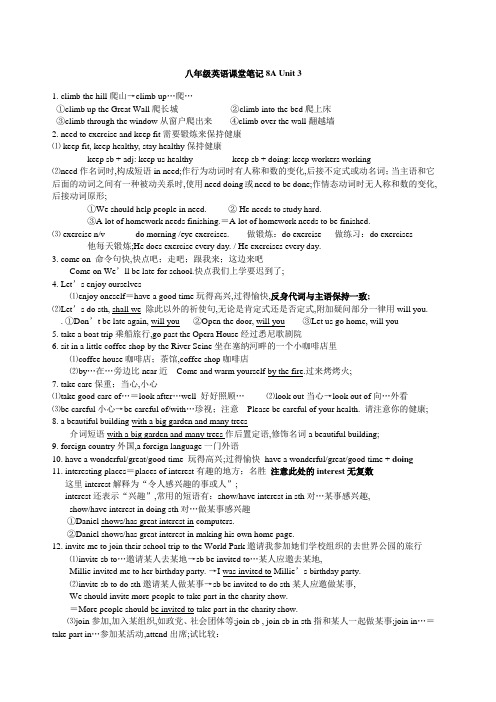
八年级英语课堂笔记8A Unit 31. climb the hill爬山→climb up…爬…①climb up the Great Wall爬长城②climb into the bed爬上床③climb through the window从窗户爬出来④climb over the wall翻越墙2. need to exercise and keep fit需要锻炼来保持健康⑴ keep fit, keep healthy, stay healthy保持健康keep sb + adj: keep us healthy keep sb + doing: keep workers working⑵need作名词时,构成短语in need;作行为动词时有人称和数的变化,后接不定式或动名词;当主语和它后面的动词之间有一种被动关系时,使用need doing或need to be done;作情态动词时无人称和数的变化,后接动词原形;①We should help people in need. ② He needs to study hard.③A lot of homework needs finishing.=A lot of homework needs to be finished.⑶ exercise n/v do morning /eye exercises. 做锻炼:do exercise 做练习:do exercises他每天锻炼;He does exercise every day. / He exercises every day.3. come on 命令句快,快点吧;走吧;跟我来;这边来吧Come on We’ll be late for school.快点我们上学要迟到了;4. Let’s enjoy ourselves⑴enjoy oneself=have a good time玩得高兴,过得愉快,反身代词与主语保持一致;⑵Let’s do sth, shall we 除此以外的祈使句,无论是肯定式还是否定式,附加疑问部分一律用will you. . ①Don’t be late again, will you ②Open the door, will you ③Let us go home, will you5. take a boat trip乘船旅行,go past the Opera House经过悉尼歌剧院6. sit in a little coffee shop by the River Seine坐在塞纳河畔的一个小咖啡店里⑴coffee house咖啡店;茶馆,coffee shop咖啡店⑵by…在…旁边比near近Come and warm yourself by the fire.过来烤烤火;7. take care保重;当心,小心⑴take good care of…=look after…well 好好照顾…⑵look out当心→look out of向…外看⑶be careful小心→be careful of/with…珍视;注意Please be careful of your health. 请注意你的健康;8. a beautiful building with a big garden and many trees介词短语with a big garden and many trees作后置定语,修饰名词a beautiful building;9. foreign country外国,a foreign language一门外语10. have a wonderful/great/good time 玩得高兴;过得愉快have a wonderful/great/good time + doing11. interesting places=places of interest有趣的地方;名胜注意此处的interest无复数这里interest解释为“令人感兴趣的事或人”;interest还表示“兴趣”,常用的短语有:show/have interest in sth对…某事感兴趣,show/have interest in doing sth对…做某事感兴趣①Daniel shows/has great interest in computers.②Daniel shows/has great interest in making his own home page.12. invite me to join their school trip to the World Park邀请我参加她们学校组织的去世界公园的旅行⑴invite sb to…邀请某人去某地→sb be invited to…某人应邀去某地,Millie invited me to her birthday party. →I was invited to Millie’s birthday party.⑵invite sb to do sth邀请某人做某事→sb be invited to do sth某人应邀做某事,We should invite more people to take part in the charity show.=More people should be invited to take part in the charity show.⑶join参加,加入某组织,如政党、社会团体等;join sb , join sb in sth指和某人一起做某事;join in…=take part in…参加某活动,attend出席;试比较:①He joined the tennis club. ② The man joined the army at the age of 19.③ He joined in the game. ④ Did you take part in your school sports meeting⑤ We’re going to plant trees. Will you join us ⑥ He joined us in the game.13. at the beginning开始;起初⑴ at the beginning=in the beginning=at first=at the start开始;起初⑵ at last, finally, in the end后来;最后;终于,与上述短语“开始,起初”意思相反;①at the beginning of…在…之初后接时间→at the end of…在…末尾,在…的尽头后接时间或地点注意:没有in the beginning of…, in the end of…②from beginning to end自始至终;从头到尾;注意:该短语不含定冠词the;⑶ begin with…=start with…先做…;以…开始. Let’s begin with Exercise 1.⑷表示“启程”、机器的“启动”只能用start;Let’s start at 6:00 a.m. tomorrow.⑸ Well begun is half done. 良好的开端是成功的一半;14. at the school gate在学校大门口at表示在较小的地方,如:at the theatre在剧院,at the party在聚会上,at the airport在机场,at the bus stop在公交站台,at the crossing, at the crossroads在十字路口15. get on a coach上长途汽车get on…/get off…上/下车/船等,. get on/get off the plane上/下飞机16. a lot of traffic=heavy traffic=busy traffic交通拥挤,作主语时谓语动词用单数;17. one / it / that those的区别Your coat is very nice. I will buy __one___ tomorrow.The weather in Beijing is colder than __that__ in Changzhou.People in China are more friendly than __those_ in the UK.I only have one copy of newspaper, do you want ___it_One 是指同类不同物,指代前面出现的单数名词,复数用ones;it指同类同物;that或those用于比较级中;试翻译:The pyramids look like the real ones.18. whole :the whole world= all the world the whole day = all day19. arrive at the World Park到达世界公园“到达”有三种表达, get to+某地,arrive at+小地方,arrive in+大地方,reach+某地;get to,arrive at/in后接地点副词时不能用介词,常用的地点副词有here, there, home;如:get/arrive here/there/home到这里/到那里/到家;20. be made of metal 由金属制成⑴be made of…由…制成,强调从制成的成品上还能看得出原材料,物理变化;The desk is made of wood. 这张桌子是木制的;⑵be made from…由…制成,表示从成品上已经看不出原材料,化学变化;Wine is made of grapes. 葡萄酒是葡萄酿成的;⑶be made up of…由…组成,由…构成,指各个部分组成整体;Our class is made up of 54 students. 我们班由54名学生组成;⑷be made in…在某地制造NOKIA mobile phones are made in Beijing.21. not …any more再也不=no more,no more, no longer用于be动词后、行为动词前⑴not …any more=no more…再也不…表示程度、数量上的不再⑵not …any longer=no longer…不再…表示时间上的不再延续 .①When the baby saw his mother, he did not cry any more.②After having some bread, she was no longer hungry.⑴more and more…越来越…;越来越多…⑵more or less几乎;差不多⑶what is more更有甚者;更为重要的是.①I’ve more or less finished reading the book. 我差不多已经读完这本书;②You’re wrong, and what is more you know it. 你错了而且你明明知道你错了22. the song and dance shows歌舞巡游,join in the dancing加入舞蹈行列23. on the Internet 在因特网上on the computer在电脑上,on the screen在屏幕上,on TV在电视上24. teach himself how to make a home page自学制作网页teach oneself…=learn…by oneself自学…,疑问词+带to的动词不定式;25. go and see for yourself亲自去看看for oneself亲自,by oneself=on one’s own=alone独自;单独—Did she find it out for herself —Yes. She did it all by herself.26. travel from one place to another从一个地方到另一地方旅行from one place to another相当于from place to place类似的有:from one country to another=from country to country;⑴from…to another中的another不能用other代替;⑵from…to…中的名词前不能用冠词a/an/the,名词不能用复数;from beginning to end自始至终,from head to foot从头到脚from morning to night27. take a look at…看一看have/take a look看一看,只强调看的动作;have/take a look at…看一看…⑴—I took a lot of photos in Shenzhen. —May I have/take a look at them⑵Take a look at the things people used in the past. 括号内的句子是定语从句;28. in the past过去,at present现在,in the future将来;未来注意介词in/at和冠词的搭配29. walk slowly around the big lake and feel the beauty of the old park in the Summer palace在颐和园里环湖漫步,感受这座古老公园的美丽⑴beauty n. ①美;美丽. A thing of beauty is a joy for ever.美的事物永远令人喜爱;语出约翰·济慈John Keats-英国文坛巨星、着名诗人,与雪莱、拜伦齐名②美人;美丽的事物,She was a beauty in her day.⑵around围绕;环绕→show sb around... 带领某人参观某地①The guide showed us around the Xuanwu Lake Park. ②The earth travels around the sun.30. Which city do you want to go to该句的疑问词which作go to的宾语,不能使用where;例如该句可以回答为I want to go to Paris/Washington/London....试比较:①Where does he live ②Which flat does he live in31. travel by underground坐地铁by underground乘坐地铁,by+交通工具,是介词短语,此时by后无介词;类似的有:by bus/train/plane/underground乘坐公共汽车/火车/飞机/地铁;表示“乘坐某交通工具去某地”通常有两种表达:①go to sp by…②take the …to…;例如:坐地铁去市中心:go to the centre of the city by underground=take the underground to the centre of the city;另外,“乘坐飞机去某地”有三种形式:go to…by plane=take the plane to…=fly to…飞往…32. learn more about old Beijing更多地了解老北京33. great fun很有趣⑴fun 名词①娱乐,嬉戏. He is full of fun.他很有趣;②有趣的人或事We had a lot of fun at the party.在聚会上我们玩得很高兴;It is fun to play cards.玩牌很有趣;不加a⑵for fun闹着玩的,. I have said it just for fun.我是说着玩的;⑶make fun of…嘲弄… . They made fun of him.34. go horse riding去骑马,. You can go horse riding in Inner Mongolia.35. keep their secret to themselves保守着他们的这个秘密⑴keep sth to oneself不将某事说出去. ①She always keeps her ideas to herself.②The problem of stress gets worse when people keep their worries to themselves.⑵keep secrets for sb 为某人保密,. Thank you so much for keeping the secret for me.⑶keep secrets from sb 对某人保密36. at the front of the bus在公交车的前部→at/in the front of…在…的前部in front of…“在…的前面”,主要指一物体在另一物体的前面,两者是分开的,反义词是behind,“在…的后面”;而at/in the front of …则指一物体中有一部分位于前部,在某物的前面部分,即两者是包容的,the front是某物的不可分割的组成部分;at/in the front of …的反义词是at the back of…在某物的后面部分;而before是“在…的面前”;①The introduction is always in/at the front of the book.序言总是置于卷首;②She sat in/at the front of the bus to get a good view of the country.③Many people took photos 在前面the Leaning Tower of Pisa.④The robber was taken 在面前the policeman.37. in the final of the basketball competition在篮球赛决赛中in the first half of the…在…的上半场比赛中,in the second half of the…在…的下半场比赛中,in the final of the…在…的决赛中,half-time中场休息,presentation of cup and medals颁发奖杯和奖牌仪式,gold medal金牌,silver medal银牌,bronze medal铜牌;注意:赢得/获得金牌:win a gold medal38. take place发生;举行,不及物动词短语,不能接宾语,不能用于被动语态中;⑴发生①The dialogue took place at a tailor’s shop. ②Great changes have taken place in China since 1989.注意:happen是“偶然发生” . What happened to him last night⑵举行=be held,. The wedding of Michael and Stella will take place next Sunday.take the place of…取代/代替…,take one’s place取代/代替某人①Here is a toy plane to take the place of the one you lost.②My sister is ill, and I’ve come to take her place.Now plastics 塑料can take the place of steel in many ways in life.39. go back to my school回到我的学校go back to=return to回到. Hong and Macao have returned to China.40. a fun place to visit动词不定式作后置定语,这里的fun是形容词,意为“有趣的”;41. the plan for today当天的计划→ plan ①n.计划②v.计划make a plan制订计划,make a/the plan for…制订…的计划,plan to do sth计划做某事. make a plan for the coming summer holiday42. change to the bus换乘公共汽车⑴change v.,“交换”,与复数宾语连用Can we change seats⑵change名词,①变化可数名词. great changes巨变②找给的零钱“Don’t forget your change” said the cashier.43. take the bus all the way to the Palace Museum乘公共汽车直达故宫44. make it a really fun day for everyone使每个人度过真正有趣的一天45. let me know as soon as possible.→let sb know as soon as possible尽快通知某人46. luck n.运气,常用于①Good luck to sb.祝某人好运;②Good luck with sth.某事好运;luck→lucky adj.幸运的,. a lucky dog幸运儿;lucky→luckily幸好,幸运地,幸运的是,常用于句首;Her handbag was stolen on her way back home. luck, she hadn’t put her keys in it.47. support v.&n.支持;养活. ① have a lot of support from sb得到某人的大力支持②Mark has a big family to support.马克养活一大家人;③with one’s support在某人的支持下support→supporter支持者;拥护者. I’m a Yao Ming supporter.我是姚明的球迷;48. instead adv. 代替. There’s nothing at the cinema. Let’s go to the Internet bar instead.→instead of+名词/代词/动名词/介词短语,代替… . Can I come at 9:00 instead of 8:0049. real/true词语辨析real和true的主要含义不同,real指确实存在、非相像的;true表示与事实相符、真实、非杜撰的;.①Was it real or was it a dream 这是真实还是梦幻②Is the news true 这消息是真的吗③a movie basedon a true story取材于真实故事的电影50. movement n. 运动;行进;走动. ①There was a sudden movement in the bushes. 灌木丛里突然有什么东西动了一下;②the women’s/peace movement 妇女/和平运动51. ticket票;券;入场券⑴ a bus/theatre/plane ticket公共汽车票/戏票/机票,Tickets are available from Arts Centre at ¥50. 艺术中心有票,每张50元;⑵ a ticket for……票, free tickets for the show演出的免费入场券⑶ a ticket office售票处,a ticket machine自动售票机,a ticket collector 收票员52. win 在比赛、赛跑、战斗中获胜,赢,后接宾语为比赛、赛跑、战斗等,不能接人作宾语→反义词lose;winner获胜者;beat在比赛或竞争中赢、打败某人,后接的宾语是人或团体;①France won the World Cup in 1998, but lost in 2002. ②Congratulations You win③He beat me at chess. ④Their recent wins have proved they’re still the ones to beat.53. cheer vi.欢呼;喝彩;cheer for…为…欢呼→cheerful高兴的;兴高采烈的,①Cheering crowds greeted their arrival.②We all cheered for our football team as they came on the field.③The crowd cheered the President when he drove slowly by.④He felt cheerful and full of energy.他感到兴高采烈,浑身充满活力;→cheers ①用于祝酒干杯,常用作Cheers ②英口再见,如:Cheers then. See you later.54. wonder ⑴奇迹. Grand Canyon is one of the natural wonders in the world.⑵想知道,常用于wonder if/whether…, wonder wh-从句.①I wonder if you can help me. ②Linda wonders where Simon is hiding.trip from Kitty’s school to the world took about two hours by coach.Sth takes sb some time by….乘坐某交通工具需要…时间;The journey from Taipei to Beijing takes three hours by plane.56. It was interesting to see models of so many places of interest from all over the world.It be+adj.+for sb+to do sth. It是形式主语,动词不定式是真正主语,因为动词不定式短语往往太长,为了避免头重脚轻,因此使用这种句型;It is necessary for them to work hard from now on.57. The cost is about ¥50 per person. 每个人的费用大约是50元;⑴cost动词,表示“某物的价值为…”用Sth cost sb some money.Tickets cost ten dollars each.每张票价为10美元;⑵cost=the money that you spend on something名词,“费用”;. the cost of the trip旅行的费用,the cost of living生活费用58.反身代词的常见考法:help yourself / yourselves to sth 请随便吃点…….make yourself/ yourselves at home.say to oneself自言自语think of oneself考虑自己teach oneself sth自学某东西teach oneself to do自学做某事teach oneself how to do自学如何做某事learn to do sth by oneself 自学做某事by oneself = alone = on one’s own独自for oneself 亲自hurt oneself 伤了某人自己。
八年级教学上册英语苏教版八年级教学8AU4Grammar语言点
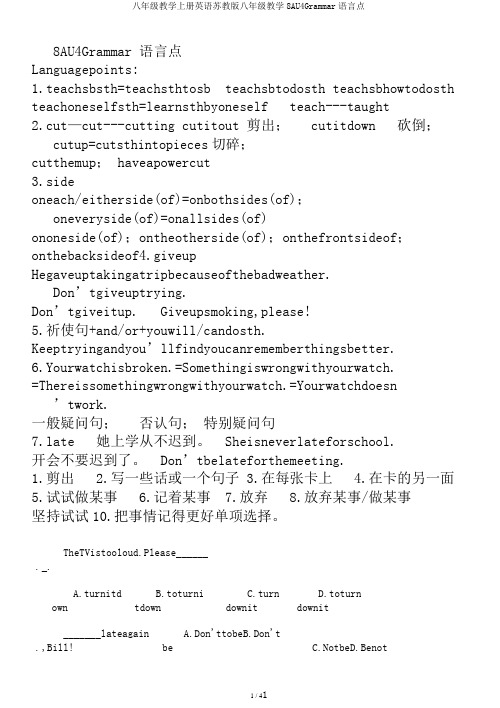
8AU4Grammar 语言点Languagepoints:1.teachsbsth=teachsthtosb teachsbtodosth teachsbhowtodosth teachoneselfsth=learnsthbyoneself teach---taught2.cut—cut---cutting cutitout 剪出;cutitdown 砍倒;cutup=cutsthintopieces切碎;cutthemup; haveapowercut3.sideoneach/eitherside(of)=onbothsides(of);oneveryside(of)=onallsides(of)ononeside(of);ontheotherside(of);onthefrontsideof;onthebacksideof4.giveup Hegaveuptakingatripbecauseofthebadweather.Don’tgiveuptrying.Don’tgiveitup.Giveupsmoking,please!5.祈使句+and/or+youwill/candosth.Keeptryingandyou’llfindyoucanrememberthingsbetter.6.Yourwatchisbroken.=Somethingiswrongwithyourwatch.=Thereissomethingwrongwithyourwatch.=Yourwatchdoesn ’twork.一般疑问句;否认句;特别疑问句te 她上学从不迟到。
Sheisneverlateforschool.开会不要迟到了。
Don’tbelatefor themeeting.1.剪出2.写一些话或一个句子3.在每张卡上4.在卡的另一面5.试试做某事6.记着某事7.放弃8.放弃某事/做某事坚持试试10.把事情记得更好单项选择。
八年级教学上册英语苏教版八年级教学8AU5Welcome语言点
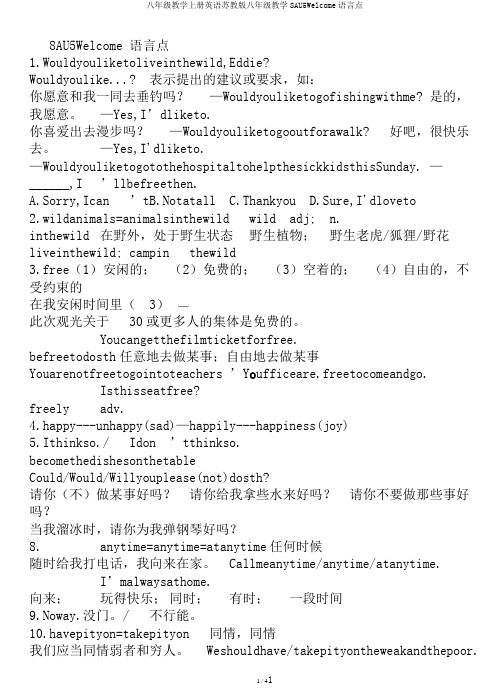
8AU5Welcome 语言点1.Wouldyouliketoliveinthewild,Eddie?Wouldyoulike...? 表示提出的建议或要求,如:你愿意和我一同去垂钓吗?—Wouldyouliketogofishingwithme? 是的,我愿意。
—Yes,I’dliketo.你喜爱出去漫步吗?—Wouldyouliketogooutforawalk? 好吧,很快乐去。
—Yes,I'dliketo. —WouldyouliketogotothehospitaltohelpthesickkidsthisSunday. —______,I ’llbefreethen.A.Sorry,Ican ’tB.NotatallC.ThankyouD.Sure,I'dloveto2.wildanimals=animalsinthewild wild adj; n.inthewild 在野外,处于野生状态野生植物;野生老虎/狐狸/野花liveinthewild; campin thewild3.free(1)安闲的;(2)免费的;(3)空着的;(4)自由的,不受约束的在我安闲时间里(3)此次观光关于30或更多人的集体是免费的。
Youcangetthefilmticketforfree.befreetodosth任意地去做某事;自由地去做某事Youarenotfreetogointoteachers ’Y o ufficeare.freetocomeandgo.Isthisseatfree?freely adv.4.happy---unhappy(sad)—happily---happiness(joy)5.Ithinkso./ Idon ’tthinkso.becomethedishesonthetableCould/Would/Willyouplease(not)dosth?请你(不)做某事好吗?请你给我拿些水来好吗?请你不要做那些事好吗?当我溜冰时,请你为我弹钢琴好吗?8. anytime=anytime=atanytime 任何时候随时给我打电话,我向来在家。
八年级上册英语(苏教版八年级)8AU4Integrated语言点(2021年整理)

(完整)八年级上册英语(苏教版八年级)8AU4Integrated语言点(word版可编辑修改)编辑整理:尊敬的读者朋友们:这里是精品文档编辑中心,本文档内容是由我和我的同事精心编辑整理后发布的,发布之前我们对文中内容进行仔细校对,但是难免会有疏漏的地方,但是任然希望((完整)八年级上册英语(苏教版八年级)8AU4Integrated语言点(word版可编辑修改))的内容能够给您的工作和学习带来便利。
同时也真诚的希望收到您的建议和反馈,这将是我们进步的源泉,前进的动力。
本文可编辑可修改,如果觉得对您有帮助请收藏以便随时查阅,最后祝您生活愉快业绩进步,以下为(完整)八年级上册英语(苏教版八年级)8AU4Integrated语言点(word版可编辑修改)的全部内容。
8AU4Integrated 语言点1.当季的水果 2。
不同颜色的水果 3。
水果色拉4。
尽量让水果色拉看起来和它尝起来一样好 5.使色拉看起来丰富多彩6. 准备水果色拉7. 在你打算吃之前 8。
变成棕色9。
把色拉留在空气中 10.是吃午饭的时候了. 11。
停止打扫房子12。
做三明治既快又简单 13。
西红柿酱 14.那样就行了15.把另一片面包放在上面 16.该考虑一下我们的暑假计划了.17。
我做完作业了(finished) 18。
不要把她一个人留在外面雨中。
19.让门关着/开着。
20。
把某物和某物混合; 21。
把某物加到某物上; 22. 把某物准备好; 23。
做某事的贴士; 24。
切碎; 25。
确保;26。
例如; 27. 停止做某事; 28.停下来去做某事;29.为某人制作某物; 30.首先,其次,最后; 31。
那就对了;32.把某物放在某物上面注: make sure to do sth/ make sure that…It’s time for sth/ It’s time to do sth/ It’s time for sb to do sthleave sb/ sth +adj/ doing sth/ to do sthfinished=over做水果色拉你需要什么?What do you need to make a fruit salad?/ What do you need for a fruit salad?/ What do you need for making a fruit salad?8AU4Task 语言点1。
- 1、下载文档前请自行甄别文档内容的完整性,平台不提供额外的编辑、内容补充、找答案等附加服务。
- 2、"仅部分预览"的文档,不可在线预览部分如存在完整性等问题,可反馈申请退款(可完整预览的文档不适用该条件!)。
- 3、如文档侵犯您的权益,请联系客服反馈,我们会尽快为您处理(人工客服工作时间:9:00-18:30)。
八年级上册英语苏教版八年级a u知识点SANY标准化小组 #QS8QHH-HHGX8Q8-GNHHJ8-HHMHGN#八年级英语课堂笔记8A Unit 31. climb the hill爬山→climb (up)…爬…①climb up the Great Wall爬长城②climb into the bed爬上床③climb through the window从窗户爬出来④climb over the wall翻越墙2. need to exercise and keep fit需要锻炼来保持健康⑴ keep fit, keep healthy, stay healthy保持健康keep sb + adj: keep us healthy keep sb + doing: keep workers working ⑵need作名词时,构成短语in need。
作行为动词时有人称和数的变化,后接不定式或动名词;当主语和它后面的动词之间有一种被动关系时,使用need doing或need to be done。
作情态动词时无人称和数的变化,后接动词原形。
①We should help people in need. ② He needs to study hard.③A lot of homework needs finishing.=A lot of homework needs to be finished.⑶ exercis e? n/v do morning /eye exercises. 做锻炼:do exercise 做练习:do exercises他每天锻炼。
He does exercise every day. / He exercises every day.3. come on (命令句)快,快点吧;走吧;跟我来;这边来吧Come on! We’ll be late for school.快点!我们上学要迟到了。
4. Let’s enjoy ourselves!⑴enjoy oneself=have a good time玩得高兴,过得愉快,反身代词与主语保持一致。
⑵Let’s do sth, shall we 除此以外的祈使句,无论是肯定式还是否定式,附加疑问部分一律用will you.. ①Don’t be late again, will you ②Open the door, will you ③Let us go home, will you5. take a boat trip乘船旅行,go past the Opera House经过悉尼歌剧院6. sit in a little coffee shop by the River Seine坐在塞纳河畔的一个小咖啡店里⑴coffee house咖啡店;茶馆,coffee shop咖啡店⑵by…在…旁边(比near近) Come and warm yourself by the fire.过来烤烤火。
7. take care保重;当心,小心⑴take (good) care of…=look after…well (好好)照顾… ⑵look out当心→look out of向…外看⑶be careful小心→be careful of/with…珍视;注意 Please be careful of your health. 请注意你的健康。
8. a beautiful building with a big garden and many trees介词短语with a big garden and many trees作后置定语,修饰名词a beautiful building。
9. foreign country外国,a foreign language一门外语10. have a wonderful/great/good time 玩得高兴;过得愉快 have a wonderful/great/good time + doing11. interesting places=places of interest有趣的地方;名胜 (注意此处的interest无复数)这里interest解释为“令人感兴趣的事或人”。
interest还表示“兴趣”,常用的短语有:show/have interest in sth对…某事感兴趣, show/have interest in doing sth对…做某事感兴趣①Daniel shows/has great interest in computers.②Daniel shows/has great interest in making his own home page.12. invite me to join their school trip to the World Park邀请我参加她们学校组织的去世界公园的旅行⑴invite sb to…邀请某人去某地→sb be invited to…某人应邀去某地,Millie invited me to her birthday party. →I was invited to Millie’s birthday party.⑵invite sb to do sth邀请某人做某事→sb be invited to do sth某人应邀做某事,We should invite more people to take part in the charity show.=More people should be invited to take part in the charity show.⑶join参加,加入某组织,如政党、社会团体等。
join sb , join sb in sth指和某人一起做某事。
join in…=take part in…参加某活动,attend出席。
试比较:①He joined the tennis club. ② The man joined the army at the age of 19.③ He joined in the game. ④ Did you take part in your school sports meeting⑤ We’re going to plant trees. Will you join us ⑥ He joined us in the game.13. at the beginning开始;起初⑴ at the beginning=in the beginning=at first=at the start开始;起初⑵ at last, finally, in the end后来;最后;终于,与上述短语“开始,起初”意思相反。
①at the beginning of…在…之初(后接时间)→at the end of…在…末尾,在…的尽头(后接时间或地点) 注意:没有in the beginning of…, in the end of…②from beginning to end自始至终;从头到尾。
注意:该短语不含定冠词the。
⑶begin with…=start with…先做…;以…开始. Let’s begin with Exercise 1.⑷表示“启程”、机器的“启动”只能用start。
Let’s start at 6:00 a.m. tomorrow.⑸ Well begun is half done. 良好的开端是成功的一半。
14. at the school gate在学校大门口at表示在较小的地方,如:at the theatre在剧院,at the party在聚会上,at the airport在机场,at the bus stop在公交站台,at the crossing, at the crossroads在十字路口15. get on a coach上长途汽车get on…/get off…上/下(车/船等),. get on/get off the plane上/下飞机16. a lot of traffic=heavy traffic=busy traffic交通拥挤,作主语时谓语动词用单数。
17. one / it / that (those)的区别Your coat is very nice. I will buy __one___ tomorrow.The weather in Beijing is colder than __that__ in Changzhou.People in China are more friendly than __those_ in the UK.I only have one copy of newspaper, do you want ___it_One 是指同类不同物,指代前面出现的单数名词,复数用ones;it指同类同物;that或those用于比较级中。
试翻译:The pyramids look like the real ones.18. whole :the whole world= all the world?????????? the whole day? = all day19. arrive at the World Park到达世界公园“到达”有三种表达, get to+某地,arrive at+小地方,arrive in+大地方,reach+某地。
get to,arrive at/in后接地点副词时不能用介词,常用的地点副词有here, there, home。
如:get/arrive here/there/home到这里/到那里/到家。
20. be made of metal 由金属制成⑴be made of…由…制成,强调从制成的成品上还能看得出原材料,物理变化。
The desk is made of wood. 这张桌子是木制的。
⑵be made from…由…制成,表示从成品上已经看不出原材料,化学变化。
Wine is made of grapes. 葡萄酒是葡萄酿成的。
⑶be made up of…由…组成,由…构成,指各个部分组成整体。
Our class is made up of 54 students. 我们班由54名学生组成。
⑷be made in…在某地制造 NOKIA mobile phones are made in Beijing.21. not …any more再也不=no more,no more, no longer用于be动词后、行为动词前⑴not …any more=no more…再也不…(表示程度、数量上的不再)⑵not …any longer=no longer…不再…(表示时间上的不再延续) .①When the baby saw his mother, he did not cry any more.②After having some bread, she was no longer hungry.⑴more and more…越来越…;越来越多… ⑵more or less几乎;差不多⑶what is more更有甚者;更为重要的是 .①I’ve more or less finished reading the book. 我差不多已经读完这本书。
